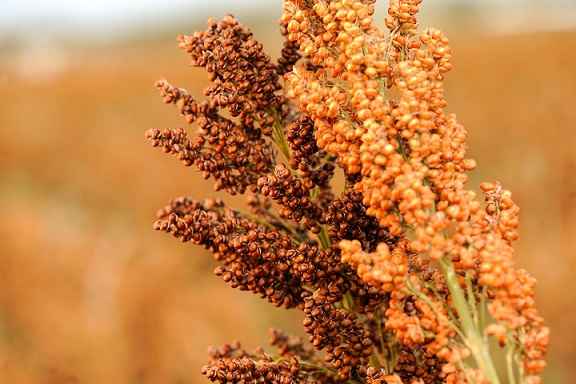Research shows that genomics can match plant variety to climate stresses
A new study on the genomic signatures of adaptation in crop plants can help predict how crop varieties respond to stress from their environments.
A new study led by a Kansas State University geneticist has shown that genomic signatures of adaptation in crop plants can help predict how crop varieties respond to stress from their environments.
It is the first study to document that these genomic signatures of adaptation can help identify plants that will do well under certain stresses, such drought or toxic soils, said Geoff Morris, assistant professor of agronomy at Kansas State University and a researcher affiliated with the university's Feed the Future Innovation Lab for Collaborative Research on Sorghum and Millet.
Researchers conducted the study with sorghum, one of the oldest and most widely grown cereal grain crops in the world. Sorghum is grown in Africa and Asia as well as in some of the world's harshest crop-growing regions. More than 43,000 sorghum varieties around the world have been collected and stored in crop gene banks, which are centers that serve as repositories for crop diversity.
"While sorghum is grown in some of the toughest climates in the world, we need to continue to increase the amount of grain it produces and its resilience to harsh environments because nearly half a billion people depend on sorghum as a staple food source," Morris said. "We want this important crop plant to produce more food and have less loss."
Sampling from the crop gene banks, Morris and colleagues at Cornell University and the International Crops Research Institute for Semi-Arid Tropics, or ICRISAT, took "snapshots" of genetic information in the genomes of about 2,000 sorghum varieties. Because each sorghum variety was from a particular known location in an African or Indian village, the researchers were able to tie the genetic differences of each variety to its survival in a particular environment.
With this data, Morris and colleague Jesse Lasky from Columbia University's Earth Institute were able to map each plant variety's "genomic signature" of environmental adaptation. This signature reflects how different plant varieties from around the world have adapted to stressors in their environment, such as drought and toxic metals in the soil.
The team then applied a drought stress to plants in the field to test whether genomic analysis could help predict what varieties would continue to thrive under drought. The team tested drought response in hundreds of different sorghum varieties at ICRISAT in India and at the University of Texas at Austin. Data showed that the genomic signatures identified what varieties were likely to do well under stress.
Researchers cataloged the findings in a database that aims to help sorghum breeders with limited resources in developing countries have better predictions of what sorghum varieties will thrive in the environment and in a growing season's forecasted weather.
"Genomic analysis will never replace testing in the field, but it can help us identify useful varieties and genes for increasing stress tolerance," Morris said. "We hope that this approach will help us develop new climate-smart varieties for farmers in the world's toughest crop-growing regions."
The study, "Genome-environment associations in sorghum landraces predict adaptive traits," is freely available through Science Advances, the American Association for the Advancement of Science's new open-access journal.
Source: Kansas State University
BİOLOGY NEWS
-
RNA from Trained Aplysia Can Induce an Epigenetic Engram for Long-Term Sensitization in Untrained Aplysia.
-
HOW WE BECOME HAPPY
-
More tomatoes, faster: Accelerating tomato engineering
-
Purest yet liver-like cells generated from induced pluripotent stem cells
-
Legions of nanorobots target cancerous tumors with precision
-
CRISPR gene editing reveals new therapeutic approach for blood disorders
-
Quantum dots with impermeable shell: A powerful tool for nanoengineering
-
Thousands on one chip: New method to study proteins
-
Gene Drive Technology: Where is the future?
-
Four newly identified genes could improve rice
-
Watching the luminescent gene switch
-
DNA damage by ultrashort pulses of intense laser light
-
Mantis shrimp inspires next generation of ultra-strong materials
-
Specialized life forms abound at Arctic methane seeps
-
Ocean warming and acidification impact on calcareous phytoplankton



